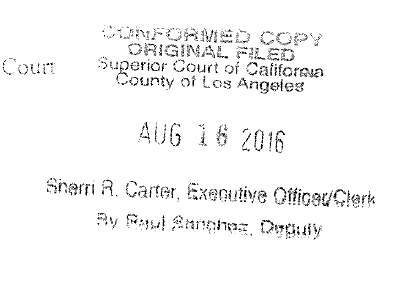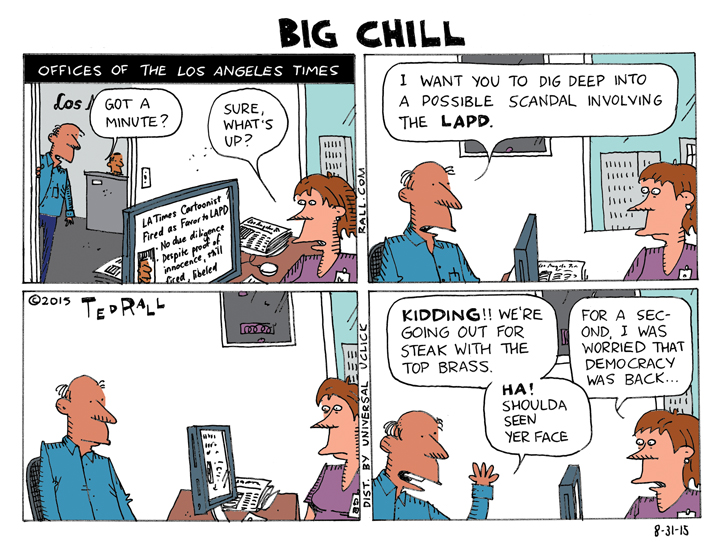
No one should get fired for his political beliefs.
Not even a Nazi.
I am disturbed by the news that some of the white nationalists who attended the violent “Unite the Right” hatefest in Charlottesville last weekend are being outted on social media. Attendees have been on the receiving end of threats and doxxing. It was reported that a restaurant worker in Berkeley was canned after he was exposed on Twitter.
Needless to say — it ought to be, anyway — I hate Nazis, Klansmen and the like. Their politics and values are exactly the opposite of mine. Still, no one should get fired for parading around with torches like it’s Germany in 1933.
This isn’t a First Amendment issue. Nothing in our outdated constitution prevents an employer from firing you on account of your politics. In 2004 an Alabama company even fired a woman for having a John Kerry for President bumpersticker on her car.
It is a free speech issue.
A business has the right to control its employees’ behavior in order to protect its image. Particularly in a liberal stronghold like Berkeley but anywhere really, no one wants a waiter wearing a swastika tattoo or spouting racist views. But if Top Dog restaurant can fire a racist dude for racist views he expresses thousands of miles away, there’s nothing to prevent Google from firing a software engineer for sexism — or you for whatever you happen to believe.
Firing a worker for their politics — especially when those politics are expressed outside the workplace — is McCarthyism. McCarthyism is wrong, McCarthyism is immoral and McCarthyism ought to be illegal.
As usual during episodes like this, many of my comrades on the left are gloating over what they see as righteous payback against violent, racist, anti-Semitic thugs. This makes me very uncomfortable, and not just because it feels more like the “human flesh search engine” online vigilantism that occurs in China than the United States, where the MYOB ethos ruled pre-Internet.
I don’t deny that this is personal. My political views have gotten me targeted by a cyberstalker/identity thief, fired by a publication over a cartoon that appeared elsewhere in another venue, and defamed by a newspaper as a favor to the local police chief who’d cozied up to the paper’s publisher. I’ve been working long enough to observe that what’s popular today gets censored tomorrow, and vice versa. Top Dog gets plaudits for firing a fascist; next time the victim could be a garden-variety Democrat.
“Historically it’s more dangerous as an employee to be associated with racial justice and the NAACP, than it was to be affiliated with the KKK,” notes Walter Greason, a historian and professor at Monmouth University.
A sign posted by Top Dog management reflects a common view: “We do respect our employees’ right to their opinions,” the sign read. “They are free to make their own choices, but must accept the responsibilities of those choices.” The question is, should those “responsibilities” include being deprived of a livelihood?
I wish I had a dollar for every time I’ve read some variation of “You have the right to be a fascist/racist/sexist/jerk/communist, but XYZ Corp. has the right to fire you too.” Or, as Oliver Wendell Holmes, Jr. wrote in 1891: “A employee may have a constitutional right to talk politics, but he has no constitutional right to be employed.”
True, that’s the law. What I’m arguing is that free speech will always be meaningless until the constitution is amended. Workers should be protected from retribution for what they think and say.
We live in a capitalist society. Except for those born rich, we must work or else starve. The U.S. is the only nation with at-will employment. And jobs are hard to find. Under these conditions, without workplace free-speech protections, employees must think twice before they attend a rally, post a controversial memo, join a party or slap a bumpersticker on their vehicle. Are you willing to risk unemployment, poverty and perhaps homelessness — not just you, but also your spouse and children? If the answer is “yes,” God bless you. History is made by people like you.
For many others, though, the answer is “no, I can’t afford free speech.” The upsides of free expression are intangible while the downside risks are terrifyingly brutal. A 2016 Harris poll found that 33% of U.S. employees are afraid to talk about politics at work. Increasingly workers have to worry about losing their jobs as the result of talking about politics outside of work too.
The American workplace is a fascist state. It’s time to overthrow the millions of little Hitlers who think the fact that issuing a paycheck turns their employees into slaves subject to thought control.
Just don’t talk about this around anyone who knows where you work.
(Ted Rall (Twitter: @tedrall) is author of “Trump: A Graphic Biography,” an examination of the life of the Republican presidential nominee in comics form. You can support Ted’s hard-hitting political cartoons and columns and see his work first by sponsoring his work on Patreon.)









